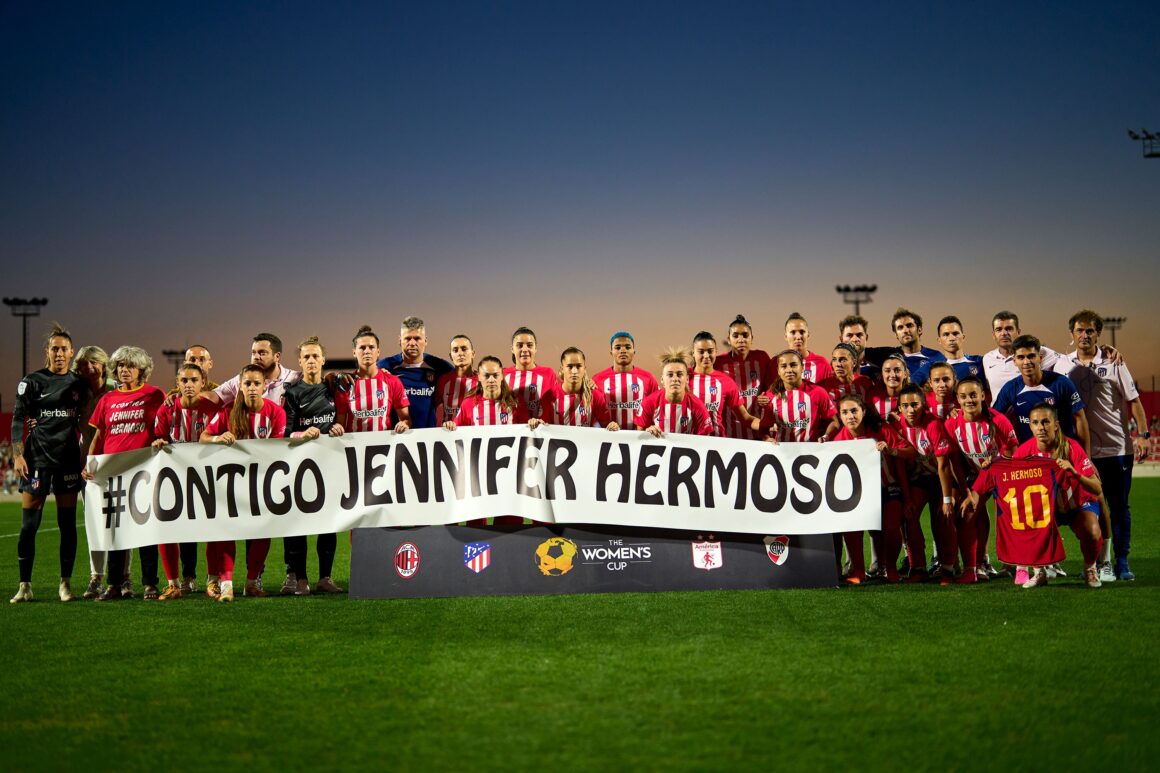By Myriam Poizat
On 20 August, social media was flooded with the Women’s World Cup. It should have been with the brilliant victory of the Spanish football team (La Roja) in the final. Instead, depicted everywhere was the image of Luis Rubiales forcing his lips onto midfielder Jenni Hermoso – degrading her, in a space of seconds, from her apotheosis as world champion to an excruciating moment of absolute powerlessness. And this for the whole world to see.
Even the women who manage to get on top of the world for a few minutes can’t enjoy fame without facing sexual harassment or assault. And for those we already hear retort, ‘it was just a peck’; it was not. It was both a full-on grab of Hermoso’s face for Rubiales to non-consensually smack his lips against hers, and simultaneously an event that continued to expose to the world that it is never ‘just a peck’, but an unacceptable and inextricable part of the whole culture of gender violence.
While the Royal Spanish Football Federation (RFEF) released a statement to defend Rubiales’ behaviour by stating Hermoso’s body language suggested she wanted to be kissed, their attempts have been in vain. The RFEF president’s crude crotch grabbing and carrying of Athenea del Castillo over his shoulder to celebrate the World Cup victory are only a couple more examples of his toxic behaviour. As a matter of fact, while Hermoso came out with a statement explicitly saying she did not consent to any kiss, statements of support with Hermoso from players, clubs and administrations have all depicted a clear culture of fear and intimidation.
Spanish Football: breaking the silence on misogyny & sexism
This only comes two years after Nevenka: Breaking the Silence, a 2021 documentary that highlighted the culture of fear, sexism and rampant homophobia under Ignacio Quedera, the coach of the Spanish team for over 27 years. This proves that the so-called ‘incident’ was not an isolated occurrence but part of systemic and deeply rooted culture of rampant misogyny in the RFEF.
Other cases of allegations in Argentina, Afghanistan, Zambia, Australia, Barbados, Canada, Colombia, Comoros, Ecuador, Gabon, Haiti, Malawi, Mongolia, Netherlands, Sierra Leone, United Kingdom, United States, Venezuela, Zimbabwe (at least!) are sending a clear message: the Spanish players have become the world champions despite being abused and mistreated by their own support team for decades. The idea that male players would be subject to similar treatment is simply unimaginable when they are, in fact, pampered – even when they have been credibly accused of serious crimes such as abuse and assault.
In the face of systemic efforts to enfeeble La Roja, the resilience and skill possessed by this team is unmatched. The women’s game is often wrongly subject to much sexist derision on the supposed grounds that the game is not as skilled as the men’s. But imagine how this team and the women’s game could flourish even further with a fraction of the support that the men’s game receives instead of being consistently undermined?
The right-wing backlash hasn’t spared sports
As Susan Wrack concluded in her Guardian article, ‘Football Must Look at How Individuals Such as Luis Rubiales Acquire Absolute Power’: “these organisations must look beyond the one man, at the culture of the sport as well as having an introspective look at how these individuals are able to acquire absolute power.”
This starts with digging at the roots of Rubiales support from a section of the football establishment. From his mother’s hunger strike over Rubiales’ suspension from FIFA, to Rubiales’ fanbase’s support, and more particularly the standing ovation from the RFEF after he claimed being a victim of a “fake feminist manhunt” and the threats of retaliation against striking football players – all these show how deep systemic misogyny runs in society like capitalism and the incentive for those at the head of the sports federations to continue right-wing attacks on the inspiringly defiant #MeToo and #NiUnaMenos movements.
Reflecting the patriarchal nature of the capitalist system it exists in, misogyny is rife across the board in the sporting world. And while in 2021, an all-male adjudicatory chamber overturned a decision against a FIFA Argentinian youth coach accused of sexual harassment and abusive behaviour towards five players – Olympian swim athlete Erica Sullivan’s 2022 quote in support of Lia Thomas, a trans co-athlete resonates stronger than ever: “As a woman in sports, I can tell you that I know what the real threats to women’s sports are: sexual abuse and harassment, unequal pay and resources and a lack of women in leadership. Transgender girls and women are nowhere on this list.”
Give Rubiales & sexism the Red Card – Strike out!
But polarisation equally means an intensified response to the right-wing backlash and a groundswell of support from women football players, athletes, and everyday people who refuse to accept abuse.
Luis Rubiales’ uncle’s statement against his nephew and in support of Hermoso; the 81 players that have refused to represent their country in a game until Rubiales is removed from his position in the RFEF; the 121 teams representing ECU’s (European Clubs Union) call on Rubiales to resign from his post; the 11 coaches and technical staff in the Spanish team that have resigned in support with Jenni Hermoso; the Lioness and other groups and athletes across genders sending solidarity to Jenni Hermoso; these are all snippets of powerful solidarity that should be deepened, activated in struggle and organised – including in player strike action.
Additionally, this year’s Women’s World Cup final hit 14.4 million in viewership figures on BBC and ITV in the UK alone. Increasing support for women’s football across genders won’t fill the pockets of exploitative men at the top of the industry without making it increasingly more difficult for misogynists to hide their abusive behaviours and assert their narratives.
While FIFA has suspended Rubiales for 90 days, UEFA must be next to respond to the overwhelming pressure to take action against its vice president. Player strike actions across Europe to pressure the federation to accede to the demands of the team for dignity and respect, along with their demands for improved conditions generally, is absolutely necessary and should be supported by the ECU, Spanish Footballers’ Association and other European footballers’ unions.
The right-wing anti-feminist, anti-trans backlash, exemplified by every one of Rubiales supporters, is unfortunately not confined to the sporting world. Inherent in the capitalist system and crisis today – let’s fight back everywhere with socialist feminism and show the patriarchal capitalist system the red card once and for all!












